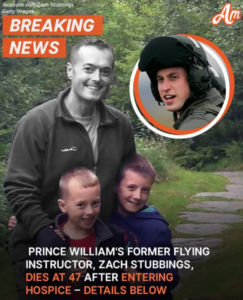Flight Sergeant Zach Stubbings, a former Royal Air Force (RAF) serviceman and flying instructor to Prince William, has died at the age of 47 after a prolonged battle with multiple myeloma, a rare form of blood and bone marrow cancer. His death has brought attention to the potential health risks associated with prolonged exposure to helicopter exhaust fumes among military personnel.
Service and Diagnosis
Stubbings joined the RAF Search and Rescue unit in 2000, dedicating 13 years to his role. During this time, he served as a winch operator on Sea King helicopters, a position that involved frequent exposure to exhaust emissions. In 2013, he was diagnosed with multiple myeloma, a decade after beginning his service. This diagnosis has been linked to his prolonged inhalation of toxic fumes from the aircraft he operated.
Training Prince William
Between 2010 and 2013, Stubbings was stationed at RAF Valley in Anglesey, where he played a pivotal role in training Prince William. The future king piloted the same Sea King helicopters during his service, underscoring the close professional relationship between the two.
Health Concerns and Legal Actions
Stubbings’ diagnosis is part of a broader concern within the military community regarding the health implications of exposure to helicopter exhaust fumes. Several former service members who operated aircraft such as the Sea King, Wessex, Puma, and Chinook helicopters have reported developing rare cancers, including non-Hodgkin lymphoma, throat cancer, lung cancer, and testicular cancer.
In 2021, after a six-year legal battle, Stubbings secured a settlement from the Ministry of Defence (MoD). The MoD acknowledged in writing that his 15 years of service were the cause of his life-threatening condition. This admission marked a significant moment for other affected personnel seeking recognition and compensation for service-related health issues.
Ministry of Defence Response
Following investigations and mounting evidence, the MoD initiated a probe into the emissions from military helicopters. An MoD spokesperson stated, “We take the health of our personnel extremely seriously and regularly review our processes to ensure that we’re doing what we can to keep our people safe. We are in the process of testing the exhaust emissions of in-service helicopters, to ensure that we … .”
Personal Tributes and Legacy
Richard Sutton, a former Navy commander and pilot who also suffers from a rare cancer linked to helicopter fumes, paid tribute to Stubbings, describing him as a “lively and bubbly … .” He highlighted the severe risks faced by those working with military aircraft and emphasized the need for continued awareness and action to protect service members.
Stubbings’ death has not only underscored the potential health risks associated with military aviation but has also paved the way for other affected personnel to come forward. His legal battle and subsequent settlement have set a precedent, encouraging others to seek accountability and compensation for service-related health issues.
Conclusion
The passing of Flight Sergeant Zach Stubbings serves as a somber reminder of the potential occupational hazards faced by military personnel. His dedication to service, even in the face of life-threatening illness, exemplifies the commitment of many who serve in the armed forces. As investigations continue and more cases emerge, it is imperative that the Ministry of Defence and related institutions prioritize the health and safety of their personnel, ensuring that such tragedies are prevented in the future.
